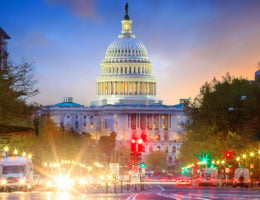On 22 May 2025, the U.S. Federal Trade Commission (FTC) and Department of Justice (DOJ) filed a Joint Statement of Interest in a lawsuit led by the State of Texas against three large investment companies. The lawsuit, led by Texas Attorney General Ken Paxton, has been joined by 10 other states and accuses the asset managers of using their positions in climate-focused investment initiatives to manipulate coal markets, driving up the cost of energy and resulting in higher energy prices for American consumers. This action, as the DOJ publicly notes, is the first formal statement by the Agencies in federal court on the antitrust implications of common shareholdings
Federal regulatory agencies have prioritized enforcement efforts that target the mishandling of data by companies that store and monetize large amounts of personal or sensitive information. This issue cuts across multiple regulatory areas which has prompted increased coordination between federal agencies. Notably, on March 26, 2024, the US Federal Communications Commission, Consumer Financial Protection Bureau, and the Federal Trade Commission, publicized a coordinated effort to increase their technological capabilities to address privacy and competition concerns related to the use of data.
The US District Court for the Southern District of Texas has granted a motion to dismiss the FTC’s lawsuit filed by private equity firm Welsh, Carson, Anderson & Stowe (WCAS), but denied the motion to dismiss filed by its minority-owned portfolio company, US Anesthesiology Partners, Inc. (USAP). The FTC alleged that WCAS and USAP developed and pursued an anticompetitive acquisition strategy to “roll-up” multiple Texas-based aesthesia practices in violation of federal antitrust law. The court granted WCAS’s motion to dismiss because it found that its minority, non-controlling stake in USAP was insufficient to support a violation of federal antitrust law.
Both the Antitrust Division of the US Department of Justice (DOJ) and the Federal Trade Commission (FTC) (collectively, “Agencies”) have submitted a joint Statement of Interest in a third-party dispute currently active in the Federal District of New Jersey. The Statement clarifies the Agencies’ positions on price fixing through the use of algorithms. The third-party dispute involves a class action against casino hotels in the Atlantic City, New Jersey area.
On 18 December 2023, the Antitrust Division of the US Department of Justice (DOJ) and the Federal Trade Commission (FTC) jointly issued their highly anticipated final version of the 2023 Merger Guidelines . The issuance of the Guidelines follows the agencies’ release of draft guidelines in July and the conclusion of a public notice-and-comment period. The Guidelines set out how the agencies assess whether mergers and acquisitions threaten anticompetitive harm in violation of US antitrust laws.
Most notably, the newly issued Guidelines retained the lower thresholds for establishing presumptions of anticompetitive harm — including if the merger gives the combined firm more than 30% market share. Additionally, the Guidelines outline a holistic approach for analyzing vertical mergers.
Last year, we warned that the Federal Trade Commission was starting to go after directors, owners and private equity firms in control of entities that violated American antitrust laws. That has now proven true.
On 21 September, the FTC filed a 106-page complaint in the US District Court for the Southern District of Texas against US Anesthesia Partners Inc. and its private equity investor, Welsh Carson Anderson & Stowe XI LP.
On Friday 16 June 2023, the Federal Trade Commission’s Bureau of Competition issued a strong warning to companies regarding the inclusion of certain types of contract terms that can “impede investigations” and “are contrary to public policy and unenforceable.” Specifically, the announcement warned against confidentiality clauses, nondisclosure agreements, and “notice of agency contact” provisions, commonly used in business-to-business and employment contracts.
On 3 February 2023, the US Department of Justice announced the withdrawal of three antitrust policy statements that allowed certain information exchanges between competitors in healthcare markets. The day before this announcement, Principal Deputy Assistant Attorney General Doha Mekki of DOJ Antitrust Division warned that DOJ would reconsider these outdated policy statements in light of recent changes in the healthcare industry.
Baker McKenzie’s Government Procurement Update resource center gives you the latest guidance, trends and enforcement actions related to government procurement (both US government contracting and international financing institutions), including suspension and debarment, bid protests, and False Claims Act defense. Calling upon our deep bench of more than 4,000 lawyers and legal professionals worldwide, we will occasionally feature guest practitioners to write about related topics in the criminal, civil, and administrative context. Readers can expect to find practical guidance and tips for compliance with public procurement policies as well as best practices for managing government inquiries and litigation.
On 15 February 2022, the Department of Defense (DoD) released a 30-page report titled State of Competition within the Defense Industrial Base (“Report”) surveying the state of competition across key defense sectors and laying out recommendations to spur increased competition in the defense industrial base. The Report is one of many required by numerous agencies in response to Biden’s July 2021 Executive Order.








